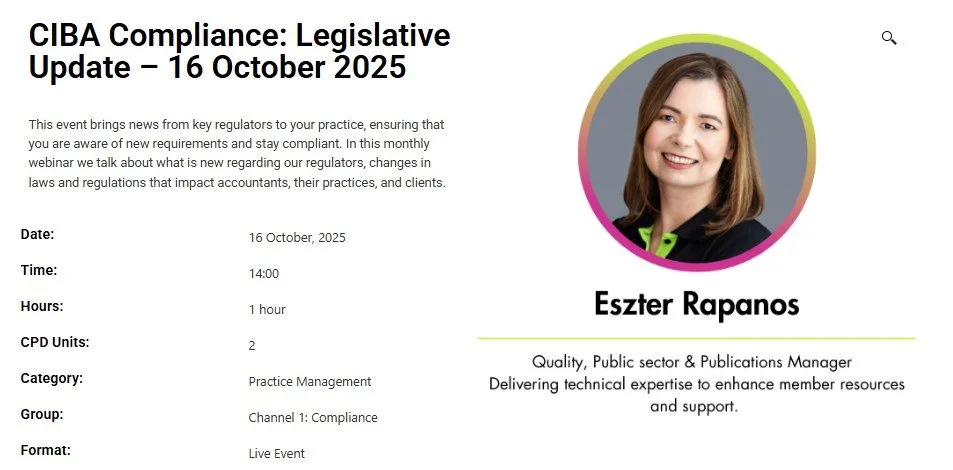5 Key Comments From CIBA on the 2025 Tax Amendment Bill
This article will count 0.25 units (15 minutes) of unverifiable CPD. Remember to log these units under your membership profile.
CIBA recently submitted comments to National Treasury and SARS on the 2025 Draft Taxation Laws Amendment Bill (DTLAB), engaging government proposals that affect everyone from educators to entrepreneurs. Below we explain what you need to know in plain language.
VAT exemption for schools
The Draft TLAB 2025 amends the VAT Act, requiring all VAT-registered schools to deregister as VAT vendors from 1 January 2026. The idea is to simplify the system by making basic education fully exempt from VAT, removing the need for schools to charge VAT on tuition and related services.
What’s the catch?
On deregistration, schools face a “deemed supply” under section 8(2H), meaning they must pay VAT on the value of all their assets (classrooms, hostels, solar panels, halls, IT labs, etc.), even though no money is received. For schools with significant infrastructure, this exit VAT bill could potentially be high, although for schools, any amount owed can create substantial challenges. Passing this on to the parents in the form of increasing fees is likely. Additionally, schools operate on set budgets that do not account for these payments, even if the proposed 12-month repayment plan is approved.
Treasury’s View
Treasury maintains that the consultation process it followed was sound, and the schools consulted were satisfied with the proposals. However, during the recent public workshop, it became clear that these consultations did not include all key stakeholders, some of whom may be significantly impacted by the provision.
Yet, Uncertainty = Anxiety
Tax experts and the public are left with many unanswered questions. Implementation guidelines are not yet available, leaving schools uncertain about how deregistration and exemption will be practically applied.
Experts from Treasury explained that the recoupment will only relate to school activities that are unrelated to the provision of educational services. These are the so-called commercial activities, such as renting facilities (e.g., halls, sports facilities) and operating a tuck shop.
What CIBA said
We support the objective of VAT simplification for schools, but the proposed approach risks severe harm.
Exit VAT liabilities will create liquidity crises, forcing some schools to raise fees, cut staff, or reduce resources for learners.
This could undermine the constitutional right to basic education (section 29) by making education less affordable and less accessible.
Leaving relief to SARS’s discretion (e.g. allowing only a 12-month repayment plan) is inadequate, inconsistent, and legally risky.
CIBA’s solution?
Provide automatic relief allowing schools to pay exit VAT over at least 24 months, with a possible extension to 36 months for schools with large asset bases.
This balances fiscal needs with the reality on the ground, ensuring schools remain financially stable while learners’ right to education is protected.
Ring-Fencing of Assessed Losses for Individuals
Currently, if you make a loss on certain activities, like part-time farming, renting out a holiday home, or hobbies that look like businesses, you can’t always offset those losses against your salary or other income. These are “ring-fenced” and can only be used against future profits from the same activity. At present, this only applies to top earners in the 45% tax bracket.
The Draft Bill now wants to extend this rule to everyone in the top three tax brackets, so anyone taxed at 39% or higher could be affected.
What’s the catch?
Many South Africans run side hustles to supplement income. In the early years, losses are expected while the business gets off the ground. The new rules would treat these losses as if they were hobby losses, even when the taxpayer is trying to establish a real business. This could discourage entrepreneurship and unfairly punish those investing in new ventures.
What CIBA said
CIBA agrees that abuse must be stopped. However, the provisions may impact entrepreneurs and start-up businesses. CIBA recommends:
Carve-outs for industries with long start-up times (like farming, tech, or film).
Turnover thresholds (e.g. R5m) so real SMEs aren’t trapped.
Phasing in: only apply the restriction after 4–5 years, giving genuine businesses a fair chance to succeed.
Exemption for Child Maintenance Receipts
Child maintenance payments are made from after-tax income and were never intended to be taxed again. But due to a drafting issue back in 2009, there has been uncertainty about whether the person receiving the maintenance should pay tax on it.
The Draft Bill clears this up by explicitly exempting child maintenance from tax (section 10(1)(u)).
What’s the catch?
The change only comes into effect from 1 March 2026, leaving a gap year of uncertainty during which SARS and taxpayers may treat payments differently.
What CIBA said
We fully support the exemption as it’s fair and logical. But it should apply retrospectively, at least covering the 2025 financial year, removing all doubt and preventing unnecessary disputes. Maintenance is support for a child, not taxable income.
Taxation of Foreign Retirement Benefits
What’s proposed?
At the moment, South African residents can receive pensions or lump sums from foreign sources tax-free under section 10(1)(gC)(ii). The Draft Bill deletes this exemption. Going forward, all foreign pensions and retirement income will be taxable in SA, unless a double-tax agreement (DTA) gives the taxing rights to the foreign country.
What’s the catch?
This closes a loophole where some retirees paid no tax at all, but it also means many South Africans who planned their retirement around the exemption could suddenly face large, unexpected tax bills. Without transitional measures, this may feel like a “bait and switch” for those already retired.
It also should be noted that SARS may gain tax on pensions but can lose on VAT revenue should pensioners retire elsewhere.
What CIBA said
We understand the need to stop double non-taxation, but fairness matters. CIBA recommends:
Transitional relief, so existing retirees aren’t hit with surprise taxes.
Clear SARS guidance on how DTAs and foreign tax credits will apply.
Protection for returning expats, who may otherwise feel penalised for bringing their pensions back to SA.
Linking Tax Rules to IFRS Accounting Standards
What’s proposed?
The Draft Bill amends sections 24I and 24JB of the Income Tax Act to link certain tax treatments directly to International Financial Reporting Standards (IFRS). For example, whether a financial instrument is treated as debt or equity, or how foreign exchange differences are deferred, would depend on IFRS rules.
What’s the catch?
IFRS is designed for investors, not for tax. It changes often and is interpreted differently across contexts. If tax law is tied directly to IFRS, every IFRS update could unintentionally change SA’s tax rules—without Parliament debating it. This creates uncertainty and risks unfair differences in how taxpayers are treated.
What CIBA said
We support aligning tax with economic reality, but tax law must stay clear and independent. CIBA recommends:
Remove direct references to IFRS.
Instead, write the intended tax rules clearly into legislation.
Use IFRS only as a guiding framework, not a binding authority.
Final Thoughts
CIBA’s stance across the board is clear: support good tax policy, but protect fairness, small business, and the vulnerable. From school fees to side hustles, every line of tax law has a real-world impact. And it’s our job to make sure those impacts don’t hurt the people they’re supposed to help.
🗳️ Got thoughts? Reach out to us or stay engaged with our policy updates. Let’s build a tax system that’s smart, fair, and future-ready.
Read CIBA's submission on the Draft Taxation Laws Amendment Bill.








